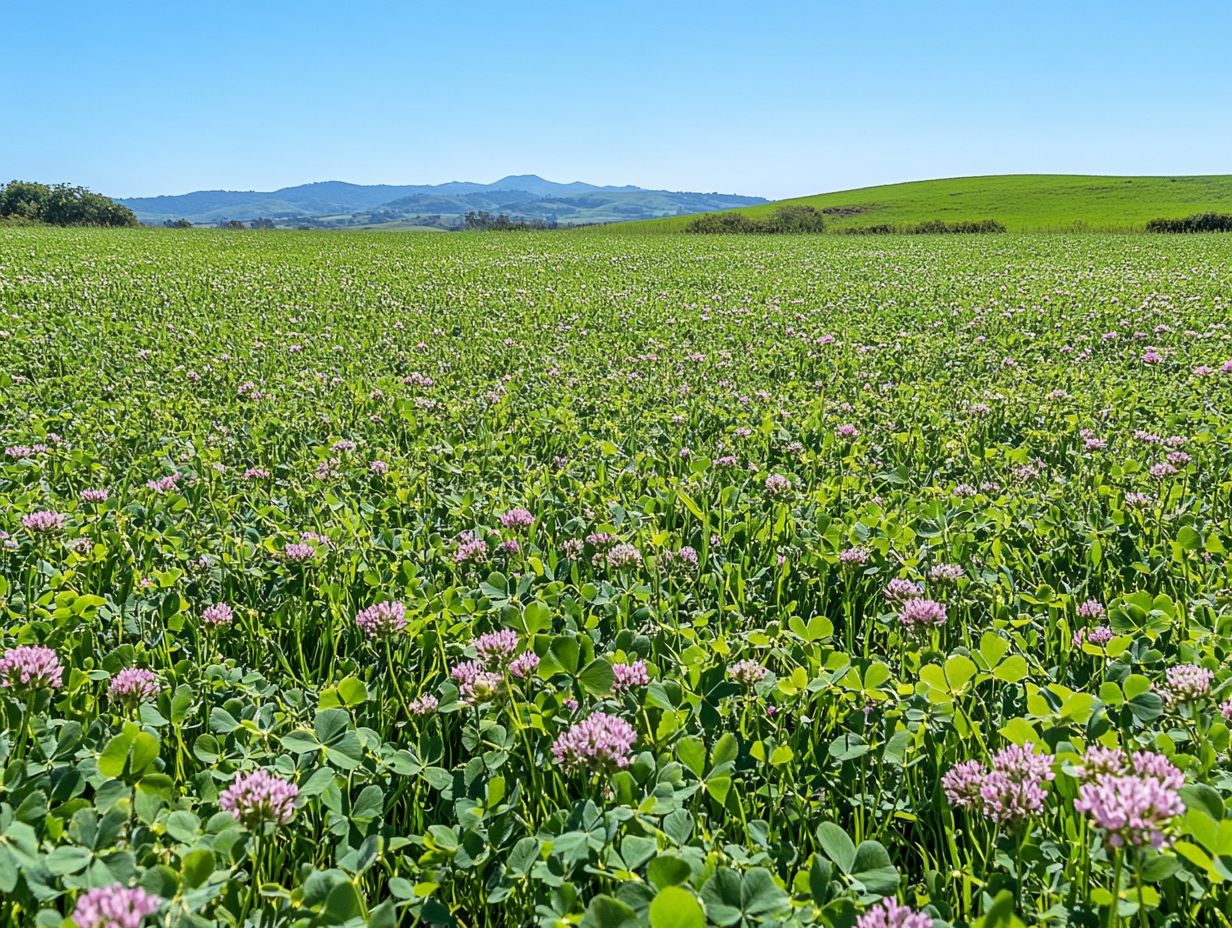“Understanding the Role of Nitrogen-Fixing Plants”
Nitrogen is an essential nutrient that plays a pivotal role in plant growth. It is the key ingredient for making chlorophyll, which helps plants make food, and is vital for proteins and DNA. This element is crucial for the overall health of various plant species, influencing their growth, fertility, and crop yield, especially in sustainable agriculture.
Many gardeners and farmers might not realize which specific plants can enrich the soil with nitrogen naturally. Nitrogen-fixing plants, especially legumes like clover and peas, are vital for improving soil fertility and boosting crop yields.
This article dives into the importance of nitrogen for plants, uncovers various types of nitrogen-fixing plants, and offers practical tips for integrating them into your organic farming practices. Revamp your garden today and enjoy the benefits of a thriving ecosystem!
Contents
- Key Takeaways:
- Why Nitrogen is a Game-Changer for Your Plants
- What are Nitrogen-Fixing Plants?
- Benefits of Nitrogen-Fixing Plants
- How Nitrogen-Fixing Plants Work
- Examples of Nitrogen-Fixing Plants
- How to Incorporate Nitrogen-Fixing Plants into Your Garden
- Frequently Asked Questions
- What are nitrogen-fixing plants and what is their role?
- How do nitrogen-fixing plants benefit the environment?
- Which types of plants are considered nitrogen-fixers?
- How do nitrogen-fixing plants impact agriculture and food production?
- Can nitrogen-fixing plants be used in landscaping and gardens?
- Are there any drawbacks to using nitrogen-fixing plants?
Key Takeaways:

- Understanding nitrogen’s role in plant growth is crucial for successful gardening.
- Boost your soil’s fertility by incorporating nitrogen-fixing plants like clover and peas.
- Explore the variety of nitrogen-fixing plants to enhance your garden.
Why Nitrogen is a Game-Changer for Your Plants
When you maintain a balanced nitrogen supply, you not only enhance plant growth but also contribute to soil health by fostering the activity of beneficial microorganisms in the soil. This relationship ensures a thriving agricultural ecosystem that benefits both you and your crops.
How Nitrogen is Essential for Plant Growth
Nitrogen is crucial for the growth and development of your crops, primarily by facilitating chlorophyll production, which is essential for photosynthesis. This element not only boosts photosynthesis but also supports vital processes like protein synthesis and amino acid formation.
For instance, legumes fix atmospheric nitrogen through a special partnership with bacteria, enriching soil fertility and enhancing growth. Urea, a common nitrogen compound, promotes rapid leaf development and strong plant structures, leading to healthier harvests and optimized nutrient uptake.
What are Nitrogen-Fixing Plants?
Nitrogen-fixing plants, primarily legumes such as clover, peas, and alfalfa, have a unique ability to transform atmospheric nitrogen into usable forms for other plants. This happens thanks to their partnership with specific bacteria like Rhizobium that live in their root nodules.
Definition and Types of Nitrogen-Fixing Plants
Legumes like alfalfa, clover, and beans are outstanding species that naturally convert atmospheric nitrogen into nutrients that enhance soil fertility. In their root nodules, these plants host helpful bacteria that convert nitrogen gas into ammonia a crucial nutrient for robust plant growth.
Beyond legumes, certain trees and shrubs also contribute to nitrogen fixation, enriching the soil. The key difference lies in their structures and the specific bacteria they host. While legumes excel in nitrogen fixation, both types of plants significantly support sustainable agricultural practices. They serve as invaluable cover crops and green manure, effectively suppressing weeds, preventing soil erosion, and improving soil structure.
This synergy fosters healthier ecosystems and boosts crop yields. Start your journey with nitrogen-fixing plants today for a lush, healthy garden!
Benefits of Nitrogen-Fixing Plants

Nitrogen-fixing plants provide a wealth of advantages, greatly enriching soil fertility and elevating crop yields. They are essential in sustainable agriculture and significantly contribute to the health of ecosystems.
Embracing these plants enhances agricultural practices and promotes a thriving environment.
Improving Soil Fertility and Crop Yield
Incorporating nitrogen-fixing plants, especially legumes, into your farming practices offers a remarkable opportunity to improve soil fertility and elevate crop yields while supporting sustainable farming.
Plants like clover and peas are vital in this process. They enhance soil structure, creating a more porous environment that allows better water infiltration and root penetration.
When these plants decompose, they release organic matter that enriches the soil, making nutrients more available for subsequent crops. This benefits your current harvest and prepares the soil for healthier crops in the future.
By employing techniques such as cover cropping and crop rotation, you can maximize these advantages. Cultivating nitrogen-fixing plants becomes part of a broader strategy to boost soil health and optimize yield sustainably, ensuring your agricultural methods are fruitful.
How Nitrogen-Fixing Plants Work
Nitrogen-fixing plants engage in a fascinating process called nitrogen fixation, which is the process of converting nitrogen from the air into a form that plants can use. In this intricate dance, specific soil microorganisms, particularly Rhizobium bacteria a type of bacteria that helps plants use nitrogen form a symbiotic relationship with the roots of these plants.
They convert atmospheric nitrogen into ammonia, a vital nutrient that the plant utilizes for its growth and development.
The Process of Nitrogen Fixation
The process of nitrogen fixation is important for farming that protects the environment. It involves nitrogen-fixing plants forming nitrogen nodules on their roots, where Rhizobium bacteria convert atmospheric nitrogen into ammonia a form that both you and your plants can easily use.
This collaboration unfolds when Rhizobium bacteria invade the roots of specific legumes, establishing a beneficial relationship. Within these nodules, nitrogen from the atmosphere undergoes transformation.
The bacteria employ an enzyme called nitrogenase to catalyze the conversion of nitrogen gas into ammonia. This ammonia can then be transformed into amino acids or other organic compounds, making it readily available for plant uptake.
This entire process enriches the soil with essential nutrients and enhances biodiversity and sustainability in ecosystems. It is a testament to the intricate mechanisms nature employs to sustain life.
Examples of Nitrogen-Fixing Plants
You will find a wealth of nitrogen-fixing plants, with legumes like clover, peas, alfalfa, vetch, and beans taking center stage. Each of these plants has distinctive qualities that enhance their value in agricultural practices.
Common Examples and Their Uses

Common examples of nitrogen-fixing plants, such as clover, peas, alfalfa, and vetch, are invaluable in agriculture for their remarkable ability to enhance soil fertility.
These plants play a key role in sustainable farming by forming symbiotic relationships with rhizobia bacteria that convert atmospheric nitrogen into a form that crops can readily use. For instance, clover can be integrated into pasture rotations as a cover crop, where it improves soil structure and supplies essential nutrients, effectively reducing your reliance on synthetic fertilizers.
Peas also serve as a dual-purpose crop: they are a fantastic source of protein and can be rotated with cereals to enrich the soil post-harvest. Alfalfa, renowned for its deep root system, excels at loosening compacted soils and enhancing moisture retention, making it an outstanding choice for boosting soil health in crop rotations.
Start using these plants today to transform your farming! Incorporating nitrogen-fixing species into your agricultural practices can significantly boost crop yields and promote sustainability across your farming operations.
How to Incorporate Nitrogen-Fixing Plants into Your Garden
Incorporating nitrogen-fixing plants into your garden significantly enhances soil health and fertility. This paves the way for improved growth and sustainability of your crops.
By employing thoughtful planting and maintenance strategies, you can cultivate a thriving ecosystem that supports long-term agricultural success.
Planting Nitrogen-Fixing Plants: Quick Tips for Success
When planting nitrogen-fixing plants, consider incorporating a variety of legume species, such as beans and peas. These plants enrich the soil and promote sustainable gardening practices.
Start by thoroughly preparing the soil to ensure it is well-aerated and free from weeds; this promotes healthy root development. Choose legume varieties that are well-suited to your local climate, like clover or vetch, as they can significantly boost nitrogen levels.
Regular maintenance, including mulching and proper watering techniques, will further support these plants, enhancing their effectiveness.
By following these practical tips, you can cultivate a vibrant garden that thrives on the benefits these remarkable plants provide.
Frequently Asked Questions
What are nitrogen-fixing plants and what is their role?
Nitrogen-fixing plants can convert atmospheric nitrogen into a usable form for other plants. They play a crucial role in the nitrogen cycle by providing essential nutrients for plant growth.
How do nitrogen-fixing plants benefit the environment?

Nitrogen-fixing plants help enrich the soil with nitrogen, essential for plant growth. This also reduces the need for chemical fertilizers, which can harm the environment.
Which types of plants are considered nitrogen-fixers?
Various plants can fix nitrogen, including legumes, trees, and shrubs. Notable examples include soybeans, peas, alfalfa, acacia, and clover.
How do nitrogen-fixing plants impact agriculture and food production?
Nitrogen-fixing plants enhance soil fertility and increase crop yields. By introducing these plants into crop rotation systems, farmers can rely less on synthetic fertilizers, leading to healthier and more sustainable food production.
Can nitrogen-fixing plants be used in landscaping and gardens?
Yes, nitrogen-fixing plants are beneficial in landscaping and gardens. Incorporating these plants can improve soil health, attract beneficial insects, and reduce reliance on chemical fertilizers.
Are there any drawbacks to using nitrogen-fixing plants?
While nitrogen-fixing plants have many benefits, they may also have some drawbacks. These plants can become invasive if not managed carefully, and some may require specific soil or climate conditions to thrive.
Start your journey today! Plant nitrogen-fixing plants to enjoy immediate benefits for your garden.






